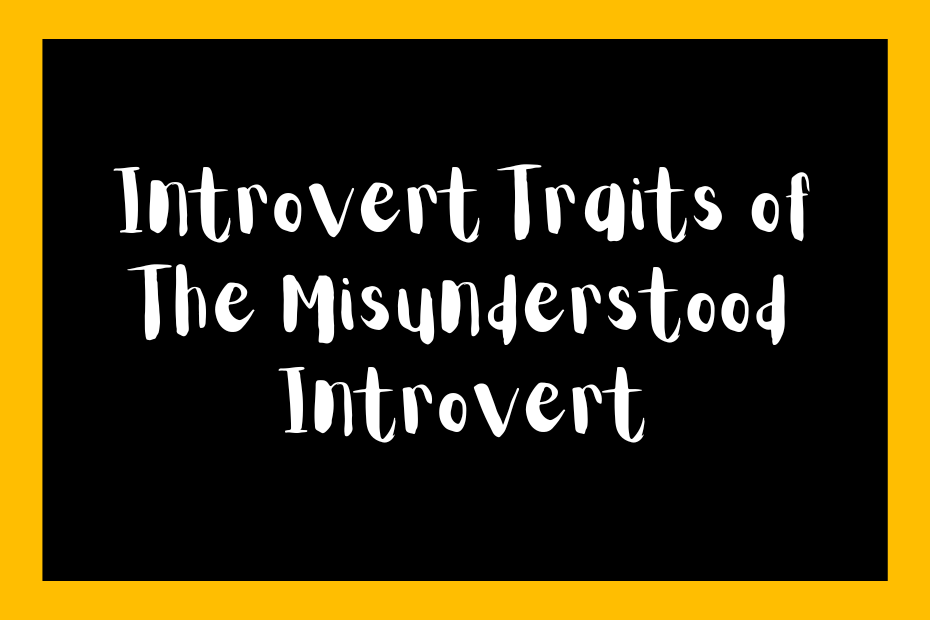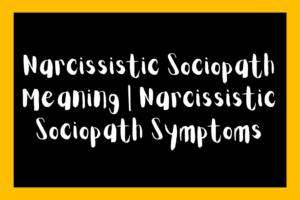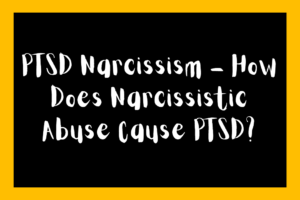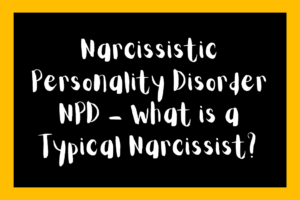Malignant Narcissist Traits
Learn how to identify malignant narcissist traits by watching them closely. Although, you might want to watch them from a safe distance. Preferably, in order to stay out of harm’s way.
What is Narcissist?
Certain people are practically impossible to get along with. Their arrogance leads them to believe that they are almost perfect. Meanwhile, everyone else is deserving of harsh criticism. Narcissists are people like this, and you probably know at least one of them. When someone initially gets to know a narcissist, they can learn to hide their genuine nature. However, after time, they will often expose their true self.
You can find more about narcissim in our article “Telltale Signs of a Narcissist”.
What Is Malignant Narcissism and How Does It Affect You?
Narcissism has long been acknowledged as a diagnosable personality disorder. Lately, public awareness of narcissistic personality disorder (NPD) has grown. Likewise, narcissistic personality in popular culture has expanded. There are various varieties of narcissism. In short, malignant narcissism is the most severe by many. This subgroup includes the general characteristics of NPD, such as self-obsession regularly. However, it also contains aggressive characteristics. For example, cruel tendencies, as well as a weak sense of self, and a lack of empathy are evident. When it comes to malignant narcissism, anxiety is frequently present.
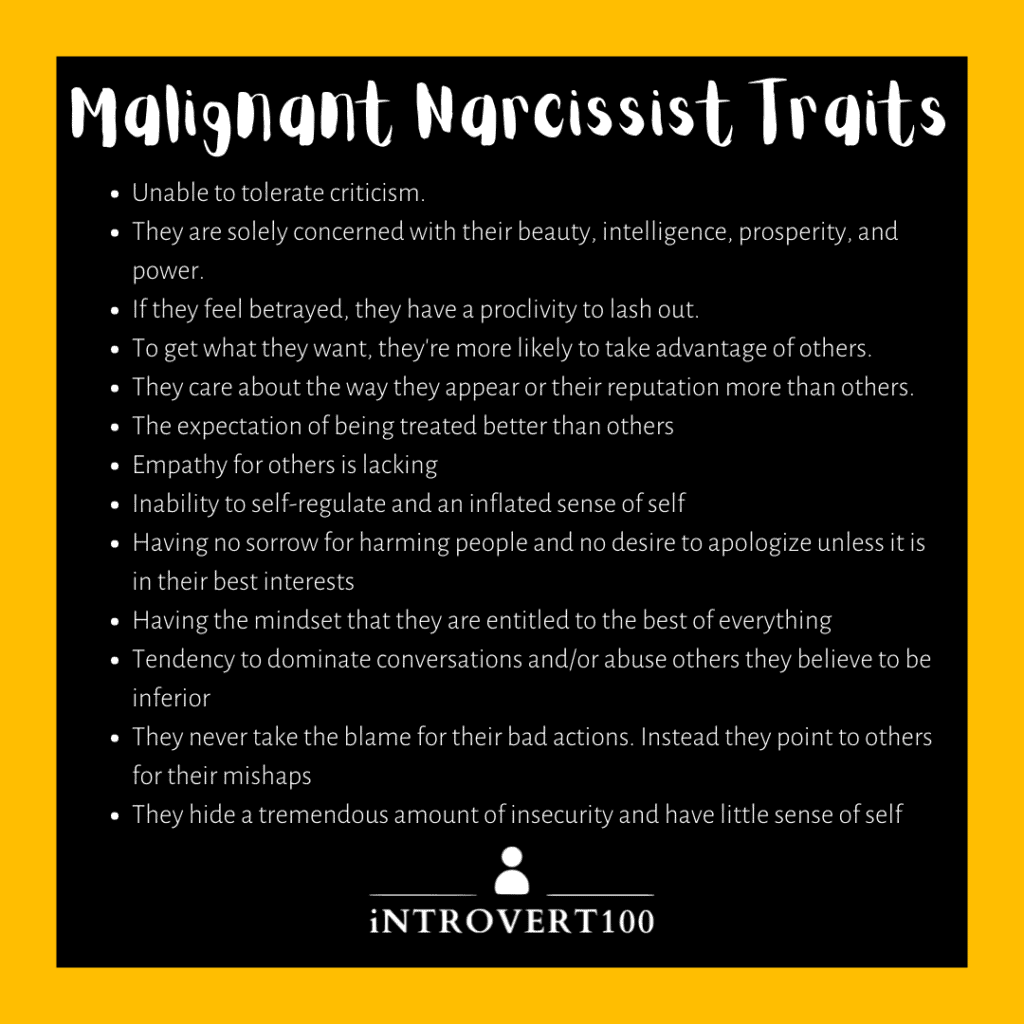
Symptoms and Signs
It may be hard to pin point narcissistic personality disorder signs and symptoms. This is due to the fact of how they vary. Similarly, so do the severity of symptoms. However, malignant narcissists frequently exhibit the following malignant narcissist traits:
- Unable to tolerate criticism.
- They are solely concerned with their beauty, intelligence, prosperity, and power.
- If they feel betrayed, they have a proclivity to lash out.
- To get what they want, they’re more likely to take advantage of others.
- They care about the way they appear or their reputation more than others.
- The expectation of being treated better than others
- Empathy for others is lacking
- Inability to self-regulate and an inflated sense of self
- Having no sorrow for harming people and no desire to apologize unless it is in their best interests
- Having the mindset that they are entitled to the best of everything
- Tendency to dominate conversations and/or abuse others they believe to be inferior
- They never take the blame for their bad actions. Instead they point to others for their mishaps
- They hide a tremendous amount of insecurity and have little sense of self
Causes
Malignant narcissism’s actual cause is unknown. Likewise, the cause of most mental illnesses is also unknown. However, NPD is caused by a combination of variables. Childhood experiences such as the ones listed below may play a role in the development of NPD:
- Abuse
- Excessive parental indulgence
- Parenting that is excessively dictatorial
- Unpredictable medical treatment
Treatment
Malignant narcissism is difficult to cure. That is to say, because narcissists rarely seek treatment or diagnosis.
It is possible to overcome narcissism. You can read more about this in our article “Overcoming Narcissism – Can You Overcome Narcissistic Personality?”
Therapy
Certain therapy may be beneficial if you suspect someone you care about has NPD. There is a lack of empirically established therapies for NPD. But, certain therapeutic techniques are frequently used:
- Psychodynamic psychotherapy
- Cognitive-behavioral therapy (CBT)
- Dialectical behavior therapy (DBT)
- Counseling for couples
How to Deal with a Malignant Narcissist
Fortunately, persons with NPD are quite predictable, so there are a few rules to follow:
- Accept that dealing with them will be challenging. Put some distance between yourself and them if possible.
- You will be disappointed if you try to alter them and expect them to change.
- If you directly challenge them, expect them to counterattack. They will do so in whatever manner they can. This could entail enlisting the help of others and attempting to turn them against you.
- If you must confront the person, do so in front of a huge audience. Otherwise, they will want to save face and will feel threatened, resulting in more anger.
- Surround yourself with helpful people as much as possible. This will help to absorb some of the negativity you may encounter with this person.
When Should You Seek Help?
Dealing with a malignant narcissist can be difficult. Even though counseling can help people with NPD, many are unwilling to seek treatment.
You should speak with a mental health professional yourself. Whether or not your loved one is being treated for their mental illness, you should still seek help for you. A therapist can help you create coping mechanisms. This will help to safeguard your mental and emotional well-being. In addition, this will help you better comprehend their narcissistic tendencies.
Conclusion:
It’s easier to put space between yourself and a malignant narcissist. It helps to know who you’re dealing with and how to communicate in the best way possible in this situation.
If you suspect a loved one is suffering from malignant narcissism, get help. Consult your doctor. A professional mental health specialist can help. This kind of support when dealing with a narcissist is beneficial to your mental health. They will help in developing coping skills, setting boundaries, and practicing self-care techniques. Support groups and group therapy may also be beneficial.
Has a mental health specialist been able to help you? Let us know in the comments.
Latest Posts
Best Selling Products









